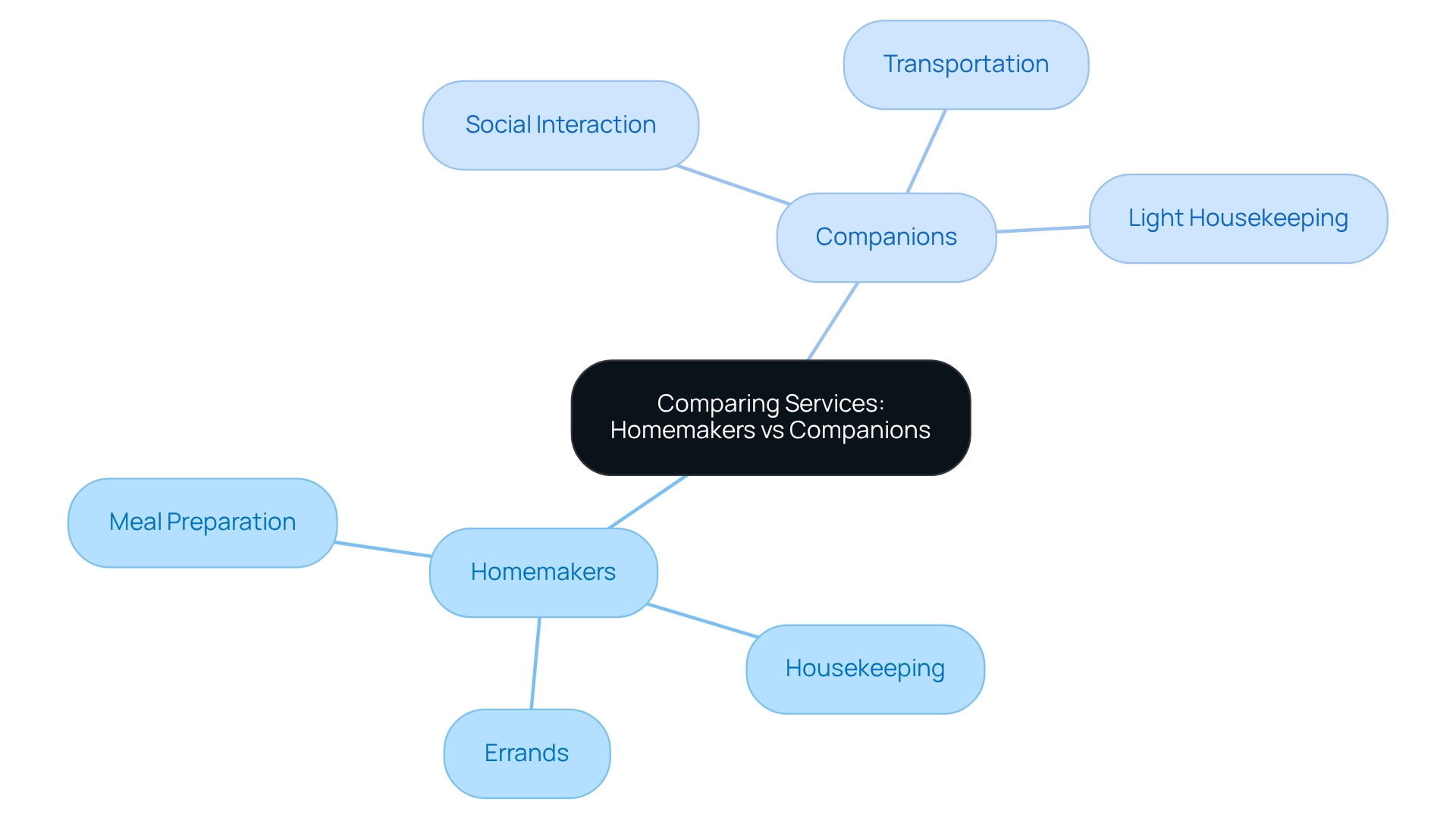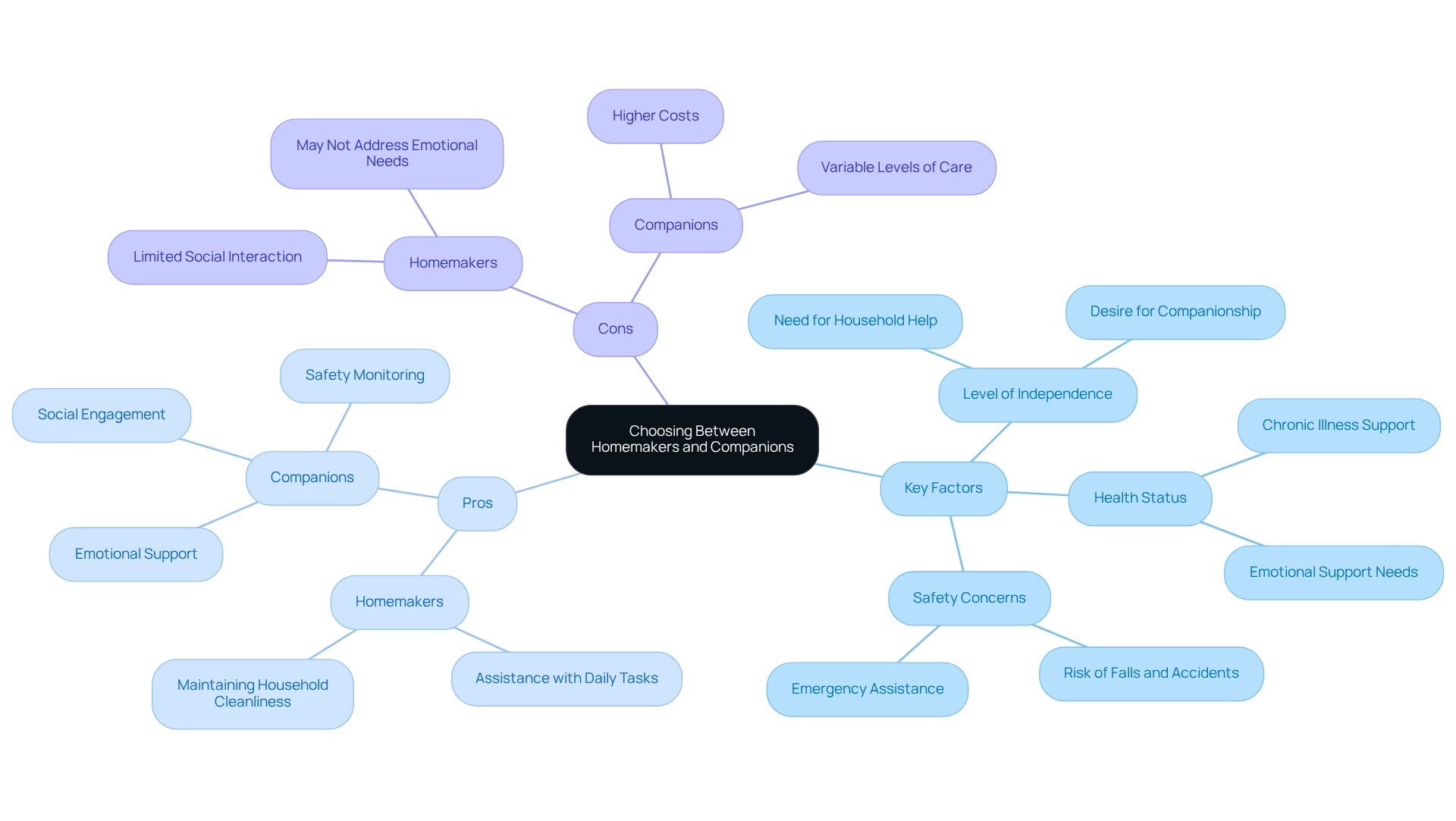Overview
In home care, understanding the distinct roles of homemakers and companions is essential for families seeking support services. Homemakers primarily focus on household maintenance tasks, ensuring that the environment is safe and comfortable. On the other hand, companions provide invaluable emotional support and social interaction, enriching the lives of individuals receiving care.
This distinction is not just a matter of duties; it speaks to the heart of what families desire for their loved ones. Each role contributes uniquely to enhancing quality of life and fostering independence. By recognizing these differences, families can make informed decisions that align with their loved ones’ needs.
As you consider support services, remember that both homemakers and companions play vital roles in creating a nurturing environment. We’re here for you, ready to help you find the right balance of care that will bring comfort and joy to your family members.
Introduction
In the intricate world of home care, understanding the distinct roles of homemakers and companions is crucial for families seeking the best support for their loved ones. Have you ever wondered how these roles can impact the well-being of those you care for? While homemakers focus on maintaining a safe and comfortable household through essential tasks like cleaning and meal preparation, companions offer invaluable emotional support and social interaction, enriching the lives of those they assist.
As the demand for home care services continues to grow—especially among the elderly—recognizing these differences can significantly enhance the quality of life for clients. By exploring the unique contributions of each role, families can make informed decisions that cater to the specific needs of their loved ones. Your comfort and peace of mind are our priority, and understanding these roles is a vital step in ensuring comprehensive and compassionate care.
Defining Homemakers and Companions in Home Care
Within the framework of Best Care Nurses Registry’s personalized services, homemakers and companions play vital yet distinct roles in the home care landscape. A homemaker is primarily responsible for maintaining a household, which encompasses tasks such as:
- Cleaning
- Meal preparation
- Laundry
- Running errands
Their focus is on creating a safe and comfortable living space for individuals, ensuring that daily household needs are met efficiently. In contrast, a companion provides emotional support and social interaction, involving individuals in conversation, activities, and companionship. While aides may assist with light housekeeping, their main objective is to enhance the client’s quality of life through meaningful social engagement and emotional connection.
Understanding these distinctions is crucial for families when choosing the right type of support for their loved ones. With around 14 million Americans aged 80 and above projected to be home assistance recipients, the increasing need for both homemakers and companions highlights their essential role in sustaining independence and quality of life. Furthermore, with an average of 286,300 individuals in adult day services each day, the evident demand for homemakers and companions highlights their vital roles in assisting participants both at home and in community environments.
Expert opinions underscore the importance of these roles in elderly care. Homemakers significantly influence the quality of life for individuals by ensuring a well-maintained environment, which can lead to improved health outcomes and greater independence. Case studies have demonstrated that efficient homemaking assistance not only reduces the strain on families but also enables individuals to uphold their dignity and independence at home. As a home support professional observed, “The presence of a committed homemaker can change a person’s living environment, enabling them to flourish in their own setting.”
Best Care Nurses Registry acknowledges the significance of flexibility in service provision, customizing assistance to address the distinct requirements of every client and offering reassurance for families. By recognizing the unique contributions of homemakers and companions, families can make informed decisions that best suit their loved ones’ needs, ensuring they receive the comprehensive support they deserve. For personalized home care solutions, contact Best Care Nurses Registry today at (888) 203-2529.
Comparing Services: What Homemakers and Companions Provide
When evaluating the offerings provided by homemakers and companions, several key distinctions arise. Homemakers and companions typically provide a range of household management assistance, including meal preparation, housekeeping, and errands, while companions focus on enhancing the emotional and social well-being of those they assist. Their offerings frequently include:
- Social Interaction: Engaging individuals in meaningful conversation and activities to combat loneliness, which is crucial for mental health and can alleviate feelings of depression and anxiety.
- Transportation: Accompanying individuals to appointments or social events, fostering independence and community involvement.
- Light Housekeeping: Assisting homemakers and companions with minor household tasks, though this is not their primary focus.
This comparison highlights the significance of understanding the specific needs of individuals needing support from homemakers and companions. With around 12 million individuals in the U.S. currently receiving home health assistance, the decision between a homemaker and a friend can greatly influence a client’s quality of life. Recent information monitoring hospitalization and emergency room visit rates from 2019 to 2023 suggests that home health assistance can effectively lessen the necessity for such interventions, underscoring the significance of homemakers and companions in preserving health and well-being. For example, a recent case study illustrated how companionship support resulted in enhanced mental health outcomes for seniors, highlighting the crucial role these offerings have in home health assistance. Additionally, as highlighted by AARP, the number of Americans over 80 is presently approximately 14 million, emphasizing the increasing demand for home assistance services for homemakers and companions among seniors. This demographic trend further highlights the significance of both homemakers and supporters in providing comprehensive care.

Assessing Suitability: Choosing Between Homemakers and Companions
Evaluating Appropriateness: Selecting Between Homemakers and Companions
Selecting between homemakers and companions requires a thoughtful evaluation of your unique needs and desires. It’s important to consider several key factors:
- Level of Independence: If you find yourself relatively independent but need help with household tasks, a homemaker might be the right fit for you. On the other hand, if companionship and social interaction are what you seek, homemakers and companions could be more suitable. They provide essential emotional support, helping to alleviate feelings of loneliness and reduce the risks associated with social isolation.
- Health Status: For those dealing with chronic illnesses or in need of emotional support, aides can make a significant difference. They encourage social engagement, which is vital for enhancing mental well-being. If you notice signs of loneliness or difficulties with daily activities, it may be time to explore support services tailored to your specific needs and schedule.
- Safety Concerns: Older adults without support services face a higher risk of falls and accidents, which can lead to serious injuries. Homemakers and companions play a crucial role in monitoring safety and providing immediate assistance during emergencies. Typically, homemakers charge based on the range of household tasks they perform, while aides focus more on social interaction, which can affect overall costs. It’s worth noting that 32% of veteran care recipients do not have health insurance, which can influence budget considerations for care options.
Pros and Cons:
- Homemakers:
- Pros: Assistance with daily tasks, maintaining household cleanliness.
- Cons: Limited social interaction, may not address emotional needs.
- Companions:
- Pros: Emotional support, social engagement, safety monitoring.
- Cons: May be more expensive depending on the level of care required.
Ultimately, your decision should align with your unique needs, ensuring you receive the appropriate level of care and support to enhance your quality of life. This personalized approach not only addresses immediate care requirements but also fosters long-term well-being. Transitioning to companion services can be a gentle process, involving discussions about the benefits with your loved one and gradually introducing these services to ensure comfort and acceptance.

Conclusion
Understanding the distinct roles of homemakers and companions in home care is essential for families seeking the best support for their loved ones. Homemakers provide vital household management services, ensuring a safe and clean environment. In contrast, companions focus on enhancing emotional well-being and social engagement. Recognizing these differences allows families to make informed decisions that cater specifically to the needs of their loved ones.
As the demand for home care services continues to rise, particularly among the elderly population, the significance of both homemakers and companions becomes increasingly clear. A well-maintained household can lead to improved health outcomes and greater independence for clients. Meanwhile, companionship can combat loneliness and promote mental wellness. This dual approach not only alleviates the burden on families but also empowers individuals to maintain their dignity and autonomy at home.
Ultimately, the choice between a homemaker and a companion should be guided by the individual’s specific needs, preferences, and circumstances. By carefully assessing these factors, families can ensure that their loved ones receive the comprehensive and compassionate care they deserve. Together, we can enhance their quality of life and well-being, providing the support that truly matters.
Frequently Asked Questions
What are the primary responsibilities of a homemaker in home care?
A homemaker is responsible for maintaining a household, which includes tasks such as cleaning, meal preparation, laundry, and running errands. Their focus is on creating a safe and comfortable living space for individuals.
What role does a companion play in home care?
A companion provides emotional support and social interaction, engaging individuals in conversation, activities, and companionship. Their main objective is to enhance the client’s quality of life through meaningful social engagement and emotional connection.
Why is it important for families to understand the distinctions between homemakers and companions?
Understanding these distinctions is crucial for families when choosing the right type of support for their loved ones, ensuring they receive the appropriate assistance that meets their specific needs.
What is the projected demand for home assistance among older Americans?
Approximately 14 million Americans aged 80 and above are projected to be recipients of home assistance, highlighting the increasing need for both homemakers and companions.
How do homemakers influence the quality of life for individuals?
Homemakers significantly influence quality of life by ensuring a well-maintained environment, which can lead to improved health outcomes and greater independence for individuals.
What is the average number of individuals in adult day services each day?
There are an average of 286,300 individuals in adult day services each day, indicating a substantial demand for homemakers and companions.
How does Best Care Nurses Registry customize its services?
Best Care Nurses Registry offers flexibility in service provision, customizing assistance to address the distinct requirements of every client and providing reassurance for families.
How can families contact Best Care Nurses Registry for personalized home care solutions?
Families can contact Best Care Nurses Registry for personalized home care solutions by calling (888) 203-2529.











